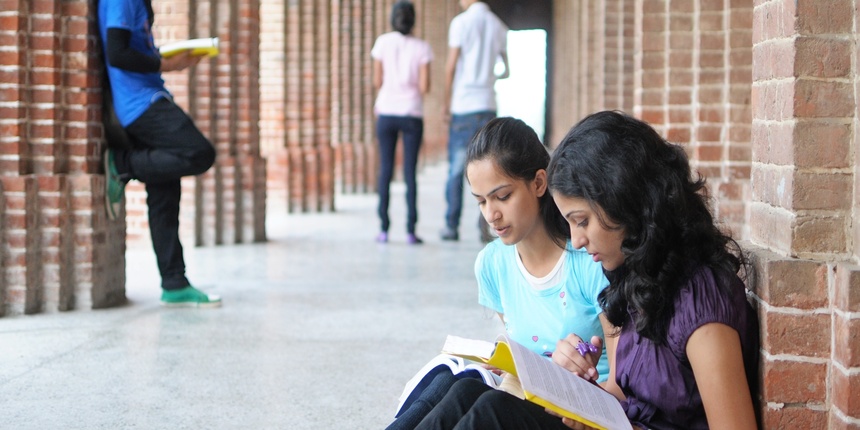CUET: Universities, colleges see major changes in admission, teaching processes after implementing NEP
Press Trust of India | December 30, 2022 | 02:50 PM IST | 3 mins read
Admission process and teaching at universities and colleges in the national capital underwent a radical change after CUET and NEP's introduction.
CUET 2025 College Predictor
Use the CUET 2025 College Predictor to shortlist universities that match your performance based on expected scores.
Try Now
NEW DELHI: The admission process and teaching at universities and colleges in the national capital underwent a radical overhaul this year with the introduction of a common entrance test and adoption of the new national education policy.
CUET UG 2025: CUET Final Answer Key 2025 PDF
Don't Miss: College Predictor | Participating Colleges
CUET UG 2025: Memory Based Questions & Analysis
Also See: Online B.Sc | Online BA | Online BBA | Online BCA
Relinquishing the old practices of admitting students, universities either partially or wholly adopted the Common University Entrance Test from the 2022-23 academic session. While the Delhi University (DU) used to admit students based on their Class 12 marks, the Jamia Millia Islamia (JMI) and the Jawaharlal Nehru University (JNU) used to have separate entrance tests for admissions to undergraduate courses.
The CUET has become the second-largest entrance test in the country, after the Joint Entrance Examination-Mains (JEE) for engineering colleges, with over 14.9 lakh aspirants taking it. Conducted for the first time this year by the National Testing Agency, the CUET had its share of criticism with last-minute changes in exam centres, mass cancellation and postponement of exams, and delayed schedules putting candidates in a tight spot.
Also Read | CUET PG 2023 from June 1 to 10, registration to begin in mid-March: UGC chief
The Delhi University through the new admission process admitted students in 79 undergraduate programmes across 67 of its colleges, departments and centres. In September, it had also launched an online platform for those seeking admission through the common seat allocation system. Through the CUET, JNU conducted admissions to 10 undergraduate courses, a majority being in its bachelor of arts (honours) courses in foreign languages. However, some varsities, including JMI, partially adopted the CUET process.
JMI through the common test admitted students in 10 courses while admission to other programmes was done through an exam conducted by the varsity. These 10 courses included: bachelor of arts with honours in Turkish Language and Literature, Sanskrit, French and Francophone Studies, Spanish and Latin American Studies, History, Hindi and Economics, bachelor of science in biotechnology and physics, and bachelor of vocation in solar energy.
From this academic session, universities implemented the National Education Policy-2020 (NEP) that proposes reforms in school as well as higher education, including technical education, with stress on promoting multilingualism and Indian languages, holistic and multidisciplinary education with multiple entry and exit options. The new policy replaces the 1986 National Policy on Education (NPE) and aims at universalisation of education from the pre-school to the secondary level with a 100 per cent gross enrolment ratio by 2030.
Also Read | NEP has revitalised education system which was earlier static: Telangana Governor
It also targets to raise the ratio in higher education to 50 per cent by 2025. The Delhi University became the first central university to adopt the four-year undergraduate curriculum prescribed by the NEP-2020. JMI and JNU are also implementing the policy. During the beginning of the year, as the Covid situation improved across the country, calls for reopening universities grew louder. Students' bodies held protests in Delhi demanding that major universities move from online mode to offline teaching.
They had claimed as campuses had been closed for almost two years and teaching was online, the "standard of education had gone down", and that students from lower-income groups and rural areas did not have access to devices for virtual learning. In February, DU, JNU and JMI were among the varsities in the national capital that started classes in the physical mode for undergraduate and postgraduate courses. The CUET and pandemic delayed the academic calendar in universities, including that of the Delhi University, drawing criticism.
While the college refused to do away with the interview, DU had said it is "firm" on its decision to declare "null and void" all admissions made by the college in violation of CUET guidelines. In letters exchanged between the college and the varsity, St Stephen's said it will accord 85 per cent weightage to the CUET score and 15 per cent to physical interviews for "all categories of candidates". The matter went to the Delhi High Court which in September ordered St Stephen's to follow the admission policy of the university. The college knocked on the doors of the Supreme Court then which refused to stay on the high court's order, bringing the tussle to an end.
Follow us for the latest education news on colleges and universities, admission, courses, exams, research, education policies, study abroad and more..
To get in touch, write to us at news@careers360.com.